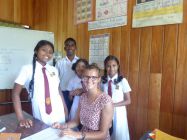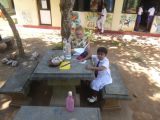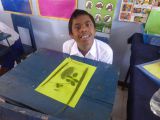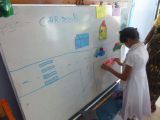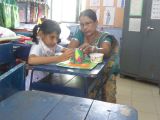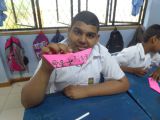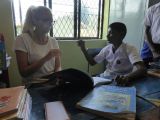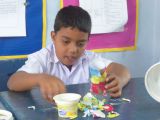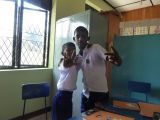Education – a mutual and benevolent process
Our two young trainees, Marie and Jana, seem to feel really marvellous at Rohana Special School. In their report they explain that not only they are teaching the students there, but that those handicapped, but often extraordinary young people can teach them a lot they have not been aware of before.
First lesson for them: Working with mentally retarded students showing different disabilities. The topic of the lesson: Experiencing the landscape of Sri Lanka with all your senses! As a final result, there should be a file for every child, a kind of portfolio and a big poster to show the community what they have found out and learned.
First step: water and sand and, of course, fish. Although the responsible teacher does not speak English very well, the problem of language is solved by Jana’s and Marie’s host brothers, who teach them the relevant Singhalese words in the evening and prepare them well for the lessons next morning. In return, the two young ladies teach the boys English language, which means a great help for them. A really good deal! Singing songs is another fantastic method of learning a language. So, Jana and Marie sing a song with their students, every morning and shortly before the end of the lesson, which is imprinted step by step in their memory.
Second step: The forest in Sri Lanka. This means going out into the open, look for different trees, their different leaves, collect them and stick them on papers.
Third step: Different sounds and noises. You can record a lot of them and try to recognize them later: blowing of the wind in the trees, heavy rain, noise of cars in the streets,….etc.
Fourth step: rice! – The most important food in Sri Lanka. What do paddy fields look like? What about the up-growth of rice and how is it
harvested? Besides, you can use rice grains and fill them into little boxes or tubes, shake them and make music. Good idea!When talking about water, you mustn’t forget boats. And when you are able to make little sailing boats by folding paper – and Marie and
Jana are really good at doing that – children will be impressed and happy, and soon there will be a huge “armada”.The next impressing experience for Marie and Jana is working with blind and deaf students and teaching English. Phonetics and speaking
the foreign language for blind children is not a big problem, but when teaching deaf children, the young ladies must learn some sign-language, which means a real challenge. So, it is not easy to answer the question: Who learns more? Students or teachers?The right answer is not that important. Both of them learn and benefit from each other, they both enjoy working together, and they feel that physical or mental handicaps, foreign languages, different religions or cultures cannot avoid or get in the way of good communication, cooperation and humanity.
On their way home from Rohana Special school, Marie and Jana go past Anura Vidyalaya, and they often meet teachers or students, “old acquaintances” of the time before Rohana. Nice feeling to meet friends and say “hello”!
